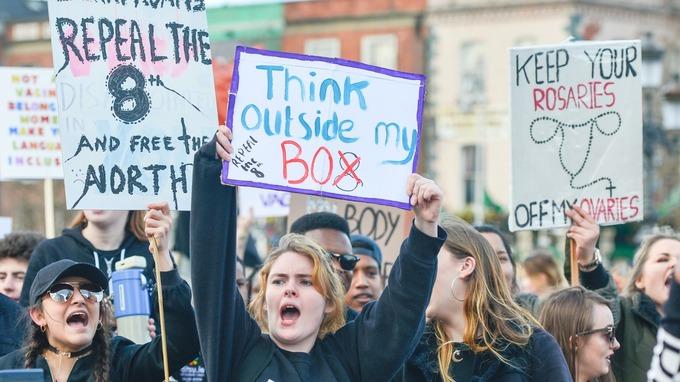The years of struggle that laid the base for Ireland’s repeal of abortion law

Image Courtesy : itv
“This is a Catholic country”, was the response received by Savita Halappanavar and her husband Praveen when they sought to terminate her pregnancy in Ireland in October 2012. She was denied permission for an abortion even when the medics knew that a miscarriage was inevitable. On October 28th, Savita died, owing to ruptured membranes and septic shock.
Savita’s death was a direct outcome of the 8th Amendment in Ireland. Added to the constitution in 1983, the amendment gave equal rights to the mother and the unborn child, thereby effectively banning abortion. A later law, the 2014 Protection of Life During Pregnancy Act, criminalized abortion with 14 years imprisonment for the mother, the doctor and anyone else involved. Savita’s case, as well as that of young women who were victims of rape but were denied abortion, were moments of reckoning for the Repeal the 8th movement. After years of campaigning and mobilizing, the movement was finally successful in achieving its goal in a referendum held on May 25.
The proposal to repeal the 8th Amendment was approved by a two-thirds majority (66% Yes to 34% No). The Yes vote won most substantially in Dublin Bay South (78%), where 90% of the working class and 91% of the middle-class supported it. The irish legislature, the Oireachtas, is now being urged to pass a law in favour of abortion, with activists urging it be called ‘Savita’s Law’.
The movement to repeal the amendment had garnered international attention and was widely supported by all progressive, feminist and civil rights groups. The Abortion Rights Campaign, founded in 2012, was a key player during the mobilization and was supported by a variety of organizations, including those on the left. Many Irish nationals who live abroad travelled short and long distances to vote, chronicling their stories online with the hashtag #HomeToVote.
This ‘Yes’ vote in the referendum will cause monumental changes to the abortion laws in the country. Abortion will now be available on request up to the 12th week of pregnancy. Between weeks 12 to 24, abortion will be legal in case of fatal foetal abnormality, a risk to the woman’s life or serious harm to her health while after week 24, abortion will be legal in case of fatal foetal abnormality only.
Conservative groups such as the Irish Centre for Bio-Ethical Reform attempted mobilizing for the ‘No’ vote by using extremely graphic images but they were rejected by the citizens of Ireland. These right-wing groups were able to mobilize massive support from other countries, especially the USA. At the same time, donations to Abortions Rights Campaign and Amnesty International Ireland were banned.
A member of the Socialist Workers Party, Marnie Holborow, said in a post in rebelnews.ie, “Many in the movement, hugely motivated by their victory, want to take things further. They want a separation of church and state, for schools to be free of religion. They want to see this result change the sterile misogynistic regime in the North of Ireland so that our northern sisters can gain full abortion rights too. Socialists will be fighting with the thousands of activists to win real choice, real equality, real change”.
Several protests, rallies, leaflet distributions and more are now being led by various groups, such as Solidarity with Repeal, seeking to bring a similar referendum to Northern Ireland, which is the only region of the UK with restrictive abortion laws.
“But I am heartened here by the full and deep participation of the Left and even a swathe of the trade union movement, committed to understanding that abortion—particularly when it requires travel and a significant outlay of cash—is a workplace issue as much as any of the other concerns that workers face. It is an issue of power and who has it and who does not”, wrote Sarah Jaffe, author and an American journalist covering labour issues.
The result of the referendum is yet another milestone in the journey towards social justice for Ireland, which was the first country in the world to legalize same sex marriage and elect an openly gay man as the prime minister. It is also likely to serve as an inspiration to similar movements that are fighting obscurantism across the world.
Get the latest reports & analysis with people's perspective on Protests, movements & deep analytical videos, discussions of the current affairs in your Telegram app. Subscribe to NewsClick's Telegram channel & get Real-Time updates on stories, as they get published on our website.























